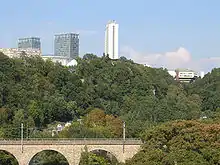European Parliament in Luxembourg
The European Parliament's presence in Kirchberg, Luxembourg currently consists of the Parliament's secretariat, although the Parliament had held plenary sessions in the city for a brief period.
History
The provisional arrangement was reiterated on 8 April 1965 with the Decision on the provisional location of certain institutions and departments of the Communities. This was following the Merger Treaty, which combined the executives of the three Communities into a single institutional structure. However with the merged executives, the Commission and most departments were grouped together in Brussels, rather than Luxembourg City. To compensate Luxembourg for the loss, the agreement granted a city the right to host a number bodies, including the Secretariat of the Assembly (now of the Parliament).[1]
Despite the 1965 agreement however, the Parliament's seat was a source of contention. Wishing to be closer to the activities in Brussels and Luxembourg City, a few plenary sessions were held by the Parliament between 1967 and 1981 in Luxembourg instead of Strasbourg – against the wishes of France and in 1981 it returned to holding sessions entirely in Strasbourg.[1]
Buildings

There are a handful of buildings in Luxembourg used by the Parliament.[2] The city hosts the Secretariat of the European Parliament (employing over 4000 people), mostly based in the Kirchberg district.
The buildings in use are the ones named after Robert Schuman (49.618176°N 6.140885°E) and Konrad Adenauer (49.621686°N 6.146743°E) and most recently two new tower buildings (TOA and TOB) either side of Av. John F. Kennedy (49.619566°N 6.142956°E).
Some services are installed in the Gold Bell building (49.587175°N 6.113736°E) in the south of the city. The old hemicycle in Luxembourg City still exists despite no longer being used by the Parliament since 1981 (it is now the seat of the EFTA Court).
See also
References
- "The seats of the institutions of the European Union". European NAvigator. Retrieved 18 July 2007.
- Map of EP Buildings in Luxembourg
External links
- Visiting Parliament EuroParl website
- Naming of the buildings EuroParl website
- Seat of the EP CVCE website
